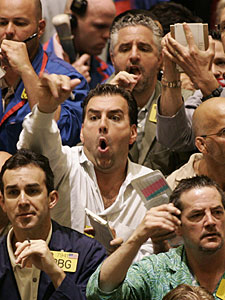Further chaos in Carbon Markets in Europe - UK are losers.
 The 21 EU Member States with active registries (Cyprus, Luxembourg, Malta and Poland figures are still not available) have allocated an annual average of 1,829.5 million allowances to installations in the ETS. Independently verified emissions data for installations operating in these 21 Member States (with a small number still to report) amounted by 30 April to approximately 1,785.3 million tonnes for 2005. 44.1 million tons less carbon dioxide, or 2.5 % less, in 2005 than expected.
The 21 EU Member States with active registries (Cyprus, Luxembourg, Malta and Poland figures are still not available) have allocated an annual average of 1,829.5 million allowances to installations in the ETS. Independently verified emissions data for installations operating in these 21 Member States (with a small number still to report) amounted by 30 April to approximately 1,785.3 million tonnes for 2005. 44.1 million tons less carbon dioxide, or 2.5 % less, in 2005 than expected.
The European Commission admitted Monday that member states had given companies far too generous targets for greenhouse gas emissions last year, (well there is a surprise) raising questions about the Continent's ability to meet its obligations under the Kyoto Protocol and triggering chaos in Europe's embryonic market in trading emissions.
It appears that the higly paid analysts in this market did not, or could not understand that European governments are more interested in protecting their companies than in reducing carbon emissions.
The EU has devised the Emissions Trading Scheme (ETS) as a model for carbon trading to fight climate change and meet its Kyoto pledges to reduce emissions of global warming gases.
12,000 utilities and high energy plants, aluminium smelters etc., have from Jan. 1st 2005, to buy and sell permits to emit carbon dioxide, which it is claimed cover approximately 40% of the EU's total CO2 emissions.
A CO2 cap has been set for each plant in the scheme, with the intention of causing a shortage keep prices high of carbon credits high, which should encourage high polluters to reduce emissions and provide a market in extra credits that "greener" plants can trade.
Prices in the freely traded credits , which are traded by anybody, not just CO2 producers fell like a stone when reports that Germany, France, Italy and other EU countries had emitted far less CO2 than had been expected. Since then against all reason and expectation they have risen. Possibibly due to people having to complete shorted positions in the market.
The UK has emitted more CO2 than its quota, forcing it to buy over 30 million tonnes extra allowances on the EU carbon market. This did not offset the overall trend, prices have fallen and so has the whole credibility of the EU scheme.
Most market analysts cited by Bloomberg news agency agree that over-allocation is the principal cause of the market mayhem , "It's clear that most countries were too generous when handing out allowances," said David Foster, head of emissions and weather derivatives at Calyon, part of Credit Agricole SA. "There's no doubt [EU countries] had an incentive to exaggerate emissions," said Per Lekander, an analyst with UBS AG in London. The scheme is a shambles , naturally the cricket playing Englishmen have played by the rules but it appaers no-one else has, and the spivs have cleaned up. Plus ca change.
The scheme is a shambles , naturally the cricket playing Englishmen have played by the rules but it appaers no-one else has, and the spivs have cleaned up. Plus ca change.
Banks, brokers, hedge funds and traders that jumped into the rapidly growing market for trading carbon emission credits are now complaining bitterly that the big difference between what countries estimated they would use and what they actually used has crewed the market Well fucking well grow up you ninies , this is the real world , full of dishonest xenophobic politicians and industrialiast who care more for the bottom line than the environment.
The spivs have of course made off with their loot.

No comments:
Post a Comment